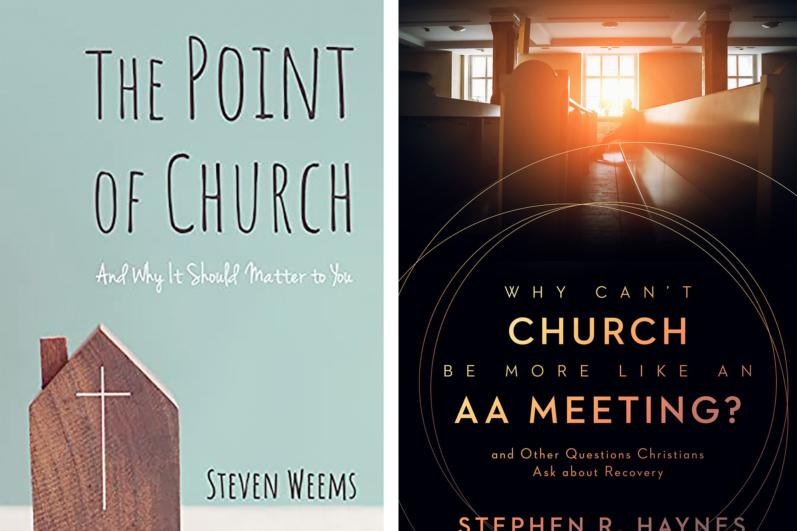One book explores what church means, another its connection to recovery
"The Point of Church: And Why It Should Matter to You" by Steven Weems. Resource Publications (Eugene, Oregon, 2021). 120 pp., $16.
"Why Can't Church Be More Like an AA Meeting? And Other Questions Christians Ask About Recovery" by Stephen R. Haynes. Wm. B. Eerdmans (Grand Rapids, Michigan, 2021). 240 pp., $19.99.
First, a heads-up for Catholic readers: The author of "The Point of Church" is a Baptist minister and pastor in Alabama. Second heads-up: Don't worry about it.
The Rev. Steven Weems knows what he's talking about and, for the most part, he uses language and concepts Catholics will -- or at least should -- have no problem with.
As Rev. Weems declares, there's "a perfectly logical reason millions of people attend worship services around the world every week." He also offers "a compelling reason why you and your loved ones should be actively involved in a local church family."
"The Point of Church" explains what "church" does and does not mean. Catholic readers will find this chapter not so much wrong as incomplete. Whether he knows it or not, Rev. Weems embraces the Catholic image of the church as the people of God.
As a Baptist, however, he naturally does not include a sacramental view of what "church" means. He comments that when his community "take(s) the Lord's Supper" they distribute small "crackers" and grape juice that "represent the body of Jesus that was broken on the cross."
Catholics, of course, believe that in the Eucharist we receive the actual whole person of the risen Christ. Ditto when it comes to the Catholic understanding of the church as "one, holy, catholic and apostolic." It would be interesting to know how Rev. Weems interprets Chapter 6 of the Gospel of John.
You also won't find anything in this book about the church as a communion of saints that transcends time and space. If anything, however, these Catholic perspectives should only add to the reasons participation in the life of the church makes perfect sense.
"The Point of Church" is a book that should be thought-provoking in the extreme. Catholics who read it may well conclude that while Rev. Weems offers a good many valuable observations, being Catholic is something to be grateful for.
"Why Can't Church Be More Like an AA Meeting?" by Stephen R. Haynes is a book on the impact of what we might call "recovery -- or 12-step -- theology" on church life.
Haynes, a Presbyterian theologian and faculty member at Rhodes College and Fuller Theological Seminary, writes with clarity and sophistication about what churches can learn from Alcoholics Anonymous.
He responds to the questions, what is recovery anyway, is recovery anti-Christian and is recovery biblical. Other questions he addresses: How are Christians reclaiming what the church gave AA, does 12-step recovery work and what about sex addiction. Finally, in an epilogue, Haynes responds to the question, when is recovery finished?
Haynes tells more than a few stories of people's experiences with both AA meetings and church life. One is from "Seeds of Grace: Reflections on the Spirituality of Alcoholics Anonymous," by Sister Molly Monahan (a pseudonym), who writes: "When my faith in my Catholic religion, and sometimes even in the existence of God, is weak, my experience in AA comes to my rescue."
This is a remarkable, gripping book on 12-step recovery programs and how they can and do support and supplement the Christian faith. Both recovering individuals and their families and friends will find in this book a wealth of knowledge and inspiration.
- - -
Also of interest: "Community as Church, Church as Community" by Michael Plekon. Cascade Books (Eugene, Oregon, 2021). 274 pp., $33.
- - -
Finley is the author of more than 30 books of popular Catholic theology, including "The Rosary Handbook: A Guide for Newcomers, Old-Timers and Those In Between" (Word Among Us Press), "What Faith is Not" (Sheed & Ward) and "The Seeker's Guide to Being Catholic" (Wipf & Stock).



















